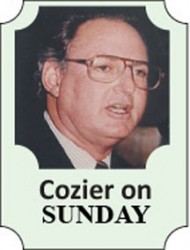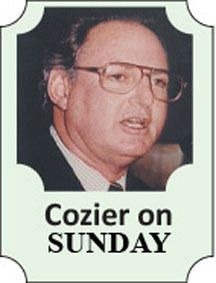Beaten and battered in two bruising campaigns, those West Indies players still standing finally stagger home this week with a bag full of questions to be asked and answered over what really went on in India and, especially, New Zealand.
Reports from media conferences on tour were filled with comments that need expansion for new director of cricket, Richard Pybus, and the cricket and executive committees of the West Indies Cricket Board (WICB).
The claim by ODI captain Dwayne Bravo on arrival in New Zealand that a lack of  unity led to the poor performances would be a prominent item in the debriefing.
unity led to the poor performances would be a prominent item in the debriefing.
So would the allusion to players’ indifference by manager Richie Richardson (“it bothers me when you see guys hang around the changing room at the ground, doing nothing like they’re still back at the hotel room”) and the mysterious “personal reasons” given for the hasty exit from New Zealand of Darren, the younger Bravo, that has set off widespread gossip.
Captain Darren Sammy’s candid acceptance that he could be one of those on return home whose “careers are on the line”, as he put it, has poured more fuel on a fire that has flickered since his appointment three years ago.
His obvious commitment to the team and the way he has handled the position in difficult times have earned Sammy a justifiable reputation as leader; the snag is that, as his stats indicate, he is a Test all-rounder purely in name.
As always, it is who as captain if not Sammy?
While New Zealand present Corey Anderson and England Ben Stokes out of nowhere, there is no young all-rounder of even that level to be presently found in a region that produced the greatest of them all.
Nor are there obvious future captains such as Virat Kohli currently is for India and Alistair Cook and Michael Clarke were when Andrew Strauss stepped down for England and Ricky Ponting for Australia.
Made skipper of the ‘A’ team in its most recent series against Sri Lanka and India, batsman Kirk Edwards appeared the likeliest contender.
The Barbados selectors essentially torpedoed that plan last week, inexplicably replacing him for the coming first-class season with Kraigg Brathwaite, a formidable challenge for the 21-year-old opener who approaches his batting with single-minded, Chanderpaulian dedication and for whom captaincy would be an unnecessary distraction.
It leaves Dwayne Bravo as the only like-for-like choice should Sammy go, as he seemingly expects to.
He is 30 and as gung-ho as ever yet he hasn’t played a Test in three years while prospering in Twenty20 leagues. Nor is he nearly the super all-rounder he promised in his early years in the West Indies team.
His elevation to the ODI captaincy last year “to refresh the leadership”, according to the selectors, was a clue to their thinking.
Sammy remained at the helm for Tests and Twenty20s; it has understandably proved a divisive arrangement.
Other long-serving candidates have been suggested.
Denesh Ramdin has been the spasmodic West Indies vice-captain, as he was in India and New Zealand, and successful skipper of Trinidad & Tobago.
To dovetail with Bravo’s West Indies’ position, he has been shunted aside for the imminent regional Super50 tournament; Trinidad & Tobago would send an unequivocal message by retaining Bravo for the first-class season as well. Those in the know regard that as unlikely.
Indeed, the former T&T captain, Daren Ganga, has gone for a long-shot.
Ramnaresh Sarwan was Brian Lara’s natural successor, taking over after the great left-hander’s retirement in 2007. Untimely injuries opened the way for Chris Gayle and Sarwan was never called on again.
Over the past few years, he fell out with the WICB’s former chief executive Ernest Hilaire and with coach Gibson. He claimed that it affected his form; the last of his 87 Tests was in June, 2011.
He is 33, hardly old age for a batsman, and says he’s committed to forcing his way back in with performance in the coming regional tournaments. As captain? Improbable but not entirely impossible.
In addition to the captaincy issues, the immediate on-field focus is on the regional tournaments over the coming three months, the Super50 in late January, early February and the first-class from late February. They assume added substance given Sammy’s blast after the New Zealand thrashing that “we cannot continue like this”.
His contention that some “careers are on the line” places pressure to perform on those who faltered in India and New Zealand, even those as established as Chris Gayle and Marlon Samuels (average 21.6 in the five Tests).
At 23, the elegant left-handed opener Keiron Powell is still seen, along with Darren Bravo, as key to the long-term batting. He kept devising frustrating ways of getting out, didn’t pass 50 once in 10 innings and averaged 22.50. He needs a productive season.
At 30 and without a hundred after 18 Tests, Narsingh Deonarine, the middle-order left-hander and useful off-spinner, has surely come to the end of the line.
So too Tino Best. For all his 90 mph pace, energy and enthusiasm, a return of 57 wickets in 25 Tests at 40 each is not a recommendation for continuation.
Shannon Gabriel, 25, and the left-arm Sheldon Cottrell, 24, carried real hopes of two tall, strong bowlers capable of intimidating pace to partner the injured Kemar Roach when his shoulder surgery mends sufficiently for his return. Technical flaws were revealed on tour that now need the attention from the coaches.
Jerome Taylor’s reappearance for Jamaica in the Super50 is encouraging news. His unforgettable 5-11 opening burst that blew England away for 51 in their second innings at Sabina Park in 2009 highlighted his quality as a pacy swing bowler.
He had 82 wickets from 29 Tests, with a hundred and a 50 to boot, before, for several reasons, he disappeared off the radar after the 2010 Queen’s Park Oval Test against South Africa. Now 29, there are hopeful expectations for his first season back.
There are a host of others who have already made their names with the ‘A’ team – the left-handed batsmen Jonathan Carter and Leon Johnson, the quick bowlers Miguel Cummins and Delorn Johnson, for instance – who must realize that now is the time to seize the moment.
West Indies cricket is certainly crying out for a regeneration.






